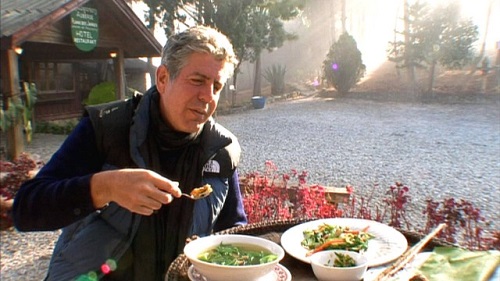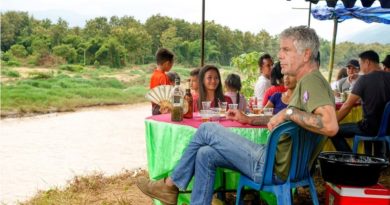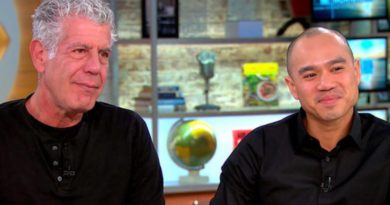Anthony Bourdain Talks Drugs, Politics, Obama, And Near-Death Experiences
Source: Gothamist
Anthony Bourdain was profiled in an excellent The New Yorker piece this week which, among other things, rubbed salt in a gaping Obama-shaped wound by detailing some of the former President’s sit-down with the insatiable world traveler in Vietnam last year. The piece, which is worth a read in its entirety, digs into everything from Bourdain’s largely stationary childhood in New Jersey to his wild druggie days to his current status as a global taste-tester. Here are a few highlights:
Bourdain is a better “ambassador for the culinary profession” than he is a creative chef:
Alan Richman, the restaurant critic at GQ, who is a champion of white-tablecloth haute cuisine, told me that Les Halles “was not a particularly good restaurant when he was cooking there, and it got worse when he stopped.” This seemed a little unfair: I frequented Les Halles before it closed, in 2016, and until the end it was rowdy and reliable, with a good frisée salad and a sturdy cassoulet. But it was never a standout restaurant. Bourdain used to genuflect like a fanboy before innovative chefs such as Éric Ripert, of Le Bernardin. On page 5 of “Kitchen Confidential,” he joked that Ripert, whom he had never met, “won’t be calling me for ideas on today’s fish special.” After the book came out, Bourdain was in the kitchen at Les Halles one day, when he got a phone call. It was Ripert, inviting him to lunch. Today, they are best friends, and Ripert often plays the straight man to Bourdain on “Parts Unknown.” A recent episode in Chengdu, China, consisted largely of shots of a flushed and sweaty Ripert being subjected to one lethally spicy dish after another while Bourdain discoursed on the “mouth-numbing” properties of Sichuan pepper and took jocular satisfaction in his friend’s discomfort.
Ripert said of Bourdain, “I have cooked side by side with him. He has the speed. He has the precision. He has the skill. He has the flavor. The food tastes good.” He hesitated. “Creativity-wise . . . I don’t know.” Over the years, Bourdain has regularly been approached about opening his own restaurant, and these offers might have yielded him a fortune. But he has always declined, mindful, perhaps, that his renown as a bard of the kitchen might be difficult to equal in the kitchen itself.
He’s also a film buff.
Bourdain elaborated that the market should bring to mind “Blade Runner”—high-end retail as grungy, polyglot dystopia. When Bourdain was growing up, his father used to rent a 16-mm. projector and show movies by Stanley Kubrick and Mel Brooks. “I’ve never met anyone who has this catalogue of films in his head,” one of his longtime cameramen, Zach Zamboni, told me. A Rome episode of “No Reservations” made black-and-white allusion to Fellini. The Buenos Aires episode on “Parts Unknown” was a nod to “Happy Together,” by Wong Kar-wai. Most viewers are unlikely to catch such references, but for Bourdain that is not the point. “When other cinematographers like it, that feels good,” he said. “It’s just like cooking—when the other cooks say, ‘Nice plate.’ It’s kind of not about the customers.” The producer Lydia Tenaglia, who, along with her husband, Chris Collins, recruited Bourdain to television for “A Cook’s Tour,” and now runs Zero Point Zero, told me that part of the reason Bourdain’s experience is so often refracted through films is that, until middle age, he had seen so little of the world. “Books and films, that was what he knew—what he had read in Graham Greene, what he had seen in ‘Apocalypse Now.’ ”
Éric Ripert set Bourdain up with his (now estranged) wife of nine years as a one-night stand.
At the time, Bourdain was in a new relationship. Éric Ripert had recently set him up with a young Italian woman named Ottavia Busia, who was a hostess at one of Ripert’s restaurants. She and Bourdain both worked incessantly, but Ripert figured that they might find time to enjoy a one-night stand. On their second date, Busia and Bourdain got matching tattoos of a chef’s knife. Eight months later, Bourdain returned, shaken, from Beirut, and they talked about having children. “Let’s spin the wheel,” Busia told him, adding, dubiously, “Your sperm is old, anyway.” Their daughter, Ariane, was born in April, 2007, and they were married eleven days later.
He’s not kidding about the drugs.
Bourdain bought his first bag of heroin on Rivington Street in 1980, and plunged into addiction with his usual gusto. “When I started getting symptoms of withdrawal, I was proud of myself,” he told me. Addiction, like the kitchen, was a marginal subculture with its own rules and aesthetics. For Bourdain, an admirer of William S. Burroughs, heroin held a special allure. In 1980, he says, he copped every day. But eventually he grew disenchanted with the addict’s life, because he hated being at the mercy of others. “Getting ripped off, running from the cops,” he recalled. “I’m a vain person. I didn’t like what I saw in the mirror.” Bourdain ended up on methadone, but he resented the indignities of the regimen: being unable to leave town without permission, waiting in line to pee in a cup. He quit cold turkey, around 1987, but spent several more years addicted to cocaine. “I just bottomed out on crack,” he recalled. Occasionally, between fixes, he would find himself digging paint chips out of the carpet in his apartment and smoking them, on the off chance that they were pebbles of crack. Things grew so bad that Bourdain recalls once sitting on a blanket on Broadway at Christmastime, with his beloved record collection laid out for sale.
Given Bourdain’s braggadocio, there were times when I wondered if the bad years were quite as grim as he makes them sound. “There are romantics, and then there are the hard-core addicts,” Karen Rinaldi said. “I think Tony was more of a romantic.” Nancy Putkoski told me in an e-mail that Tony is “pretty dramatic.” She wrote, “It does look pretty bleak in the rearview mirror. But, when you’re living it, it’s just your life. You struggle through.” Once, Bourdain was riding in a taxi with three friends, having just scored heroin on the Lower East Side. He announced that he had recently read an article about the statistical likelihood of getting off drugs. “Only one in four has a chance at making it,” he said. An awkward silence ensued. Years later, in “Kitchen Confidential,” Bourdain pointed out that he made it and his friends had not. “I was the guy.”
His travels have made him surprisingly political.
Bourdain is comfortable being seen as a purveyor of escapism; he is less comfortable with the responsibility that attends the show’s more serious material. In an episode set in Laos, he ate freshwater fish and bamboo shoots with a man who had lost an arm and a leg when a U.S. explosive, left over from the war, detonated. In Hanoi, one of Obama’s staffers told him that, until the episode aired, some people in the White House had been unaware of the extent of the unexploded-ordnance problem in Laos. “Very casually, he said, ‘So I guess you do some good after all,’ ” Bourdain recalled. “I’m a little embarrassed. I feel like Bono. I don’t want to be that guy. The show is always about me. I would be bullshitting you if I said I was on some mission. I’m not.”
Nevertheless, Bourdain knows that most viewers who caught his Congo episode had read little about the conflicts there. I was reminded of how Jon Stewart, whenever someone observed that many young people got their news from “The Daily Show,” protested, unpersuasively, that he was just a comedian cracking jokes. Bourdain’s publisher, Dan Halpern, said, “Whether he likes it or not, he’s become a statesman.”
He got a pretty gnarly skin infection at a jujitsu tournament in…Manhattan. And then he almost died.
But in Normandy he found that he couldn’t write. His body was itchy and swollen from the rash, and he had a throbbing pain in his head. Because he looked hideous, he left the villa only after dark, like a vampire. Finally, Bourdain sought out a French doctor, who gave him a battery of painkillers and anti-inflammatories. After impulsively swallowing a week’s supply, Bourdain realized that he had not eaten in thirty-six hours. He drove to a café in a nearby town, Arachon, and ordered spaghetti and a bottle of Chianti. He was halfway through the wine when he realized that he was sweating through his clothes. Then he blacked out.
When he woke up, Bourdain was lying with his feet in the café and his head in the street. A waiter was rifling through his pockets, in search of a driver’s license, as if to identify a corpse. Bourdain’s father had died suddenly, at fifty-seven, from a stroke, and Bourdain often thinks about dying; more than once, he told me that, if he got “a bad chest X-ray,” he would happily renew his acquaintance with heroin. Taking meds and booze on an empty stomach was just a foolish mistake, but it left him shaken. He stood up, reassured the startled onlookers, drove back to the villa, and immediately wrote a long e-mail to Nancy Putkoski.
When I asked him what he wrote, Bourdain paused and said, “The sort of thing you write if you, you know, thought you were going to die. ‘I’m fucking sorry. I’m sure I’ve acted like I wasn’t.’ We’ve had very little contact—you know, civil, but very, very little. ‘I’m sorry. I know that doesn’t help. It won’t fix it, there’s no making amends. But it’s not like I don’t remember. It’s not like I don’t know what I’ve done.’ ”
You can read the whole thing online.



